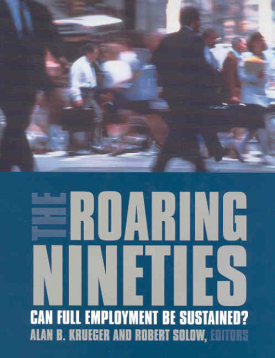
The Roaring Nineties
About This Book
The positive social benefits of low unemployment are many—it helps to reduce poverty and crime and fosters more stable families and communities. Yet conventional wisdom—born of the stagflation of the 1970s—holds that sustained low unemployment rates run the risk of triggering inflation. The last five years of the 1990s—in which unemployment plummeted and inflation remained low—called this conventional wisdom into question. The Roaring Nineties provides a thorough review of the exceptional economic performance of the late 1990s and asks whether it was due to a lucky combination of economic circumstances or whether the new economy has somehow wrought a lasting change in the inflation-safe rate of unemployment.
Led by distinguished economists Alan Krueger and Robert Solow, a roster of twenty-six respected economic experts analyzes the micro- and macroeconomic factors that led to the unexpected coupling of low unemployment and low inflation. The more macroeconomically oriented chapters clearly point to a reduction in the inflation-safe rate of unemployment. Laurence Ball and Robert Moffitt see the slow adjustment of workers' wage aspirations in the wake of rising productivity as a key factor in keeping inflation at bay. And Alan Blinder and Janet Yellen credit sound monetary policy by the Federal Reserve Board with making the best of fortunate circumstances, such as lower energy costs, a strong dollar, and a booming stock market.
Other chapters in The Roaring Nineties examine how the interaction between macroeconomic and labor market conditions helped sustain high employment growth and low inflation. Giuseppe Bertola, Francine Blau, and Lawrence M. Kahn demonstrate how greater flexibility in the U.S. labor market generated more jobs in this country than in Europe, but at the expense of greater earnings inequality. David Ellwood examines the burgeoning shortage of skilled workers, and suggests policies—such as tax credits for businesses that provide on-the-job-training—to address the problem. And James Hines, Hilary Hoynes, and Alan Krueger elaborate the benefits of sustained low unemployment, including budget surpluses that can finance public infrastructure and social welfare benefits—a perspective often lost in the concern over higher inflation rates.
While none of these analyses promise that the good times of the 1990s will last forever, The Roaring Nineties provides a unique analysis of recent economic history, demonstrating how the nation capitalized on a lucky confluence of economic factors, helping to create the longest peacetime boom in American history.
ROBERT SOLOW is Institute Professor Emeritus, M.I.T., and a Nobel laureate in economics.
ALAN KRUEGER is professor of economics at Princeton University.
CONTRIBUTORS: Katharine G. Abraham, Laurence Ball, Giusepe Bertola, Rebecca M. Blank, Francine D. Blau, Alan S. Blinder, Jessica Cohen, William T. Dickens, David T. Ellwood, James R. Hines Jr., Hilary W. Hoynes, George Johnson, Lawrence M. Kahn, Lisa M. Lynch, Robert Moffitt, Stephen J. Nickell, Adam Posen, Matthew D. Shapiro, Robert Shimer, Matthew J. Slaughter, Douglas Staiger, James H. Stock, Janet L. Yellen, Mark W. Watson.
Copublished with The Century Foundation
